SpaceLog
SpaceLog: An app for capturing multimodal location-based data
Background
Urban living environments are facing increasing pressure to adapt due to crises such as the climate crisis. Despite participatory planning processes, there is still insufficient knowledge in many urban places about how certain target groups react to these places and, conversely, what needs or wishes they have for these urban places. Multi-modal, finely resolved data (voice recordings, videos, images or background noises, see also [1]), combined with scales of emotional, place-related perceptions, can help to place target group-specific needs on a broader empirical basis than calls for participation, which are usually only followed by a small number of citizens:
- Where are feel-good places in the city? Which ones are particularly important on hot days?
- Where are social meeting points and safe places for certain target groups? Where do they feel unsafe?
- Which places have an inadequate quality of stay but could easily be upgraded?
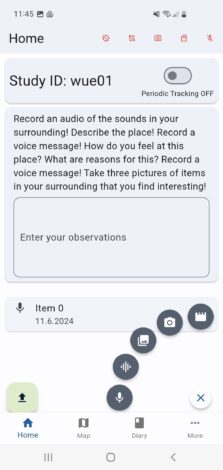
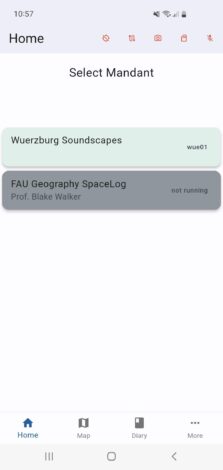
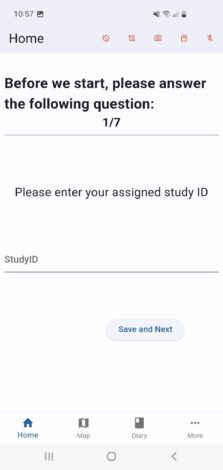
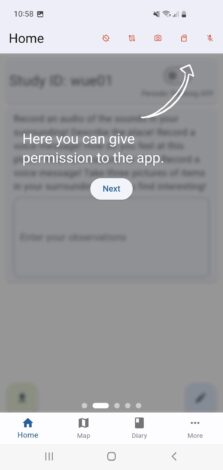
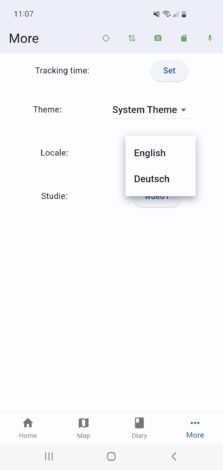
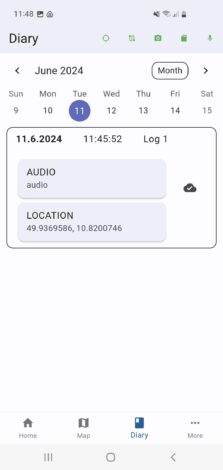
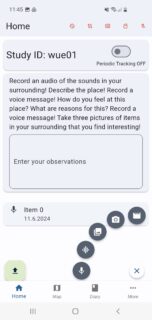
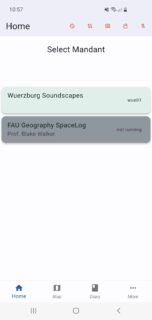
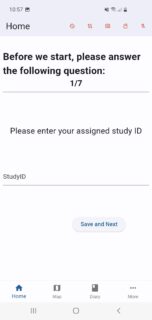
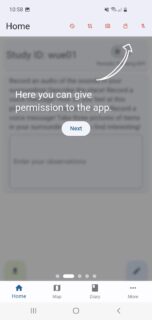
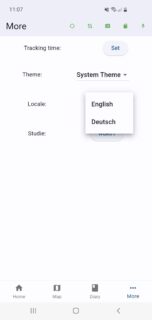
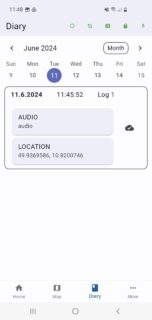
“SpaceLog” is an application that enables multimodal and location-based data collection for research into individual environmental experience. Unlike comparable applications, it integrates all the necessary work steps into one workflow. It is aimed at researchers from the fields of digital humanities, social and health geography, ethnography and cognitive sciences. Thanks to its user-friendly design, SpaceLog makes it easy to collect data on individual perceptions of the environment, mobility and personal well-being. Specific questionnaires or rating scales, e.g. for measuring mental well-being, can also be integrated depending on the research interest.
The app was originally developed to enable a better understanding of the influence of the local environment on health and well-being, based on concepts from health geography, such as therapeutic landscapes [2]. The focus here is on the perceived well-being of local users. Especially in the field of mental and social health, data on the interaction between people and place is needed to provide insights into different needs and perceptions, but the application can also be used in other contexts and knowledge interests.
Features at a glance
- Multimodal data collection: Capture text, audio, image/video and movement data – directly on site and all in one app
- GIS integration: location-based data and movement profiles
- Diary function: tracking observations and editing independent of location and time
- Self-monitoring: linking personal perception and mental state – making connections between well-being and environment visible
- Customizable: Integration of individual questionnaires – possible to use SpaceLog in different contexts and for different study objectives
Details
SpaceLog can be installed directly on a smartphone or tablet. The application is currently available English and German. A dashboard for viewing and exploring the collected data is accessible via a browser.
- Studies or projects are stored as clients in the application and receive their individual study ID, which users must use to register before starting. In addition, the users themselves receive an identification number so that observations can be clearly assigned despite anonymization and in compliance with the applicable data protection regulations.
- Access permissions (e.g. to the camera, microphone and location) can be individually managed directly in the application using easily visible icons.
- After logging in to the respective study, users can record their observations via the intuitive user interface and upload text descriptions, audio, image and video files.
- The observations can then be viewed either via the integrated map service using the location (if the location of the observation was recorded) or via the “Diary” tab in chronological order.
The dashboard then allows researchers to view the collected data. The integrated view shows all data linked to an observation and thus enables an initial exploration of possible correlations. There are also various filter options, for example to display only observations made by a specific person.
Dashboard
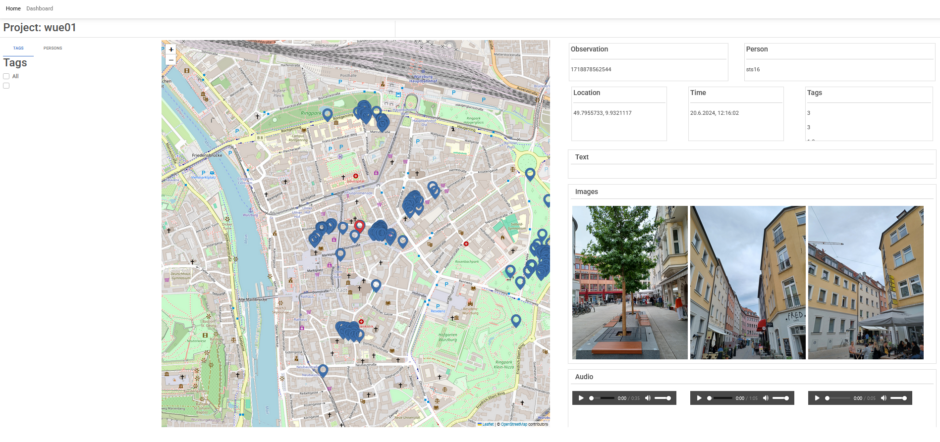
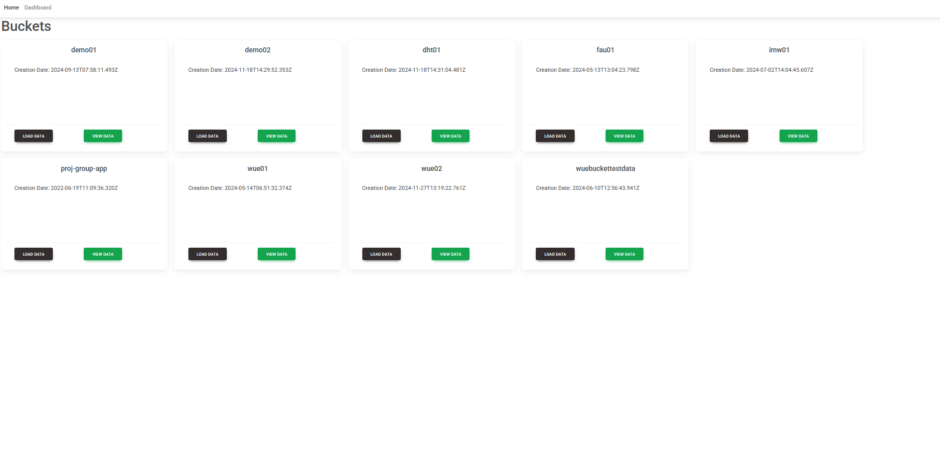
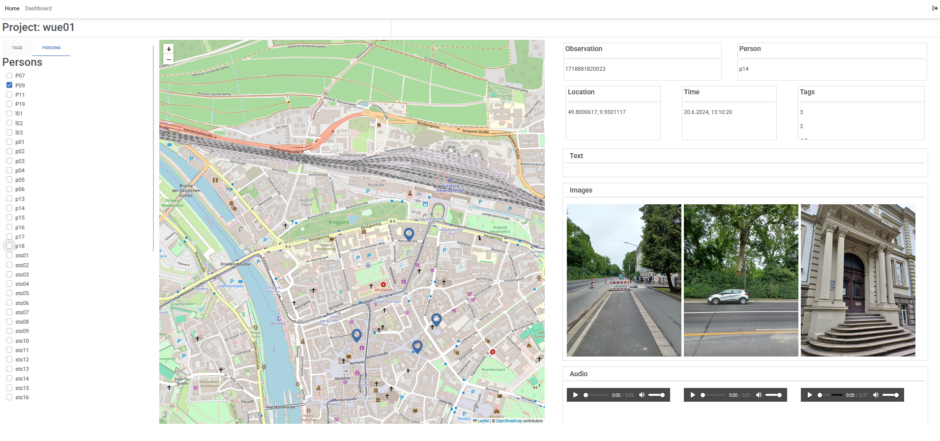
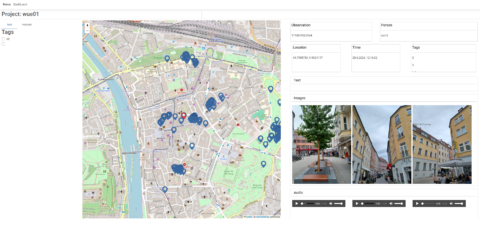
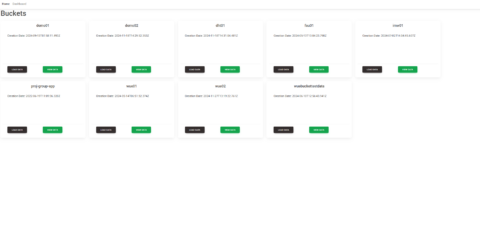
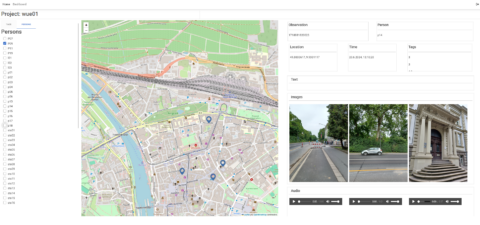
Project partners
First cooperation partners for interdisciplinary use have already been found for the project:
- AG Digital Health Geographies of the Friedrich-Alexander-University Erlangen-Nuremberg
- The Super Test Site Würzburg project in cooperation with the Julius-Maximilians-Universität Würzburg and the Karlsruhe Institute of Technology
- Christine Richter of the Fraunhofer Institute for Systems and Innovation Research ISI/location Leipzig for an autoethnographic cartography of “Energy Landscapes” in the South of Leipzig
Contact
SpaceLog has been developed, tested several times and will soon be available in the app stores. Feel free to contact us for a test version in the meantime!
dominik.kremer@fau.de
Literature
- Neuner A, Kremer D, Walker BB (2025):
Urban green spaces and mental wellbeing: A methodology for measuring structural characteristics of individual-level green space exposure and its associations with wellbeing.
Geomatica Preprint
https://doi.org/10.1016/j.geomat.2025.100051 - Kremer D, Neuner A, Jelinski S, Stadlmeier A, Schlieder C, Walker BB (2023):
Tracing Individual Experiences of Everyday Greenness: Initial Results from the SpaceLog Mobile App.
GI_Forum 11, 47-58.
https://doi.org/10.1553/giscience2023_02_s47